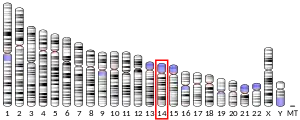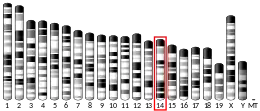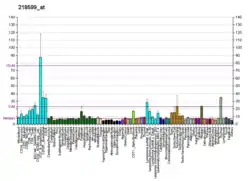REC8
Meiotic recombination protein REC8 homolog is a protein that in humans is encoded by the REC8 gene.[5][6][7][8]
Rec8 is a meiosis-specific component of the cohesin complex that binds sister chromatids in preparation for the two divisions of meiosis. Rec8 is sequentially removed from sister chromatids. It is removed from the arms of chromosomes in the first division - separating homologous chromosomes from each other. However, Rec8 is maintained at centromeres so that sister chromatids are kept joined until anaphase of meiosis II, at which point removal of remaining cohesin leads to the separation of sister chromatids.
Function
This gene encodes a member of the kleisin family of SMC (structural maintenance of chromosome) protein partners. The protein localizes to the axial elements of chromosomes during meiosis in both oocytes and spermatocytes. REC8 protein appears to participate with other cohesins STAG3, SMC1ß and SMC3 in sister chromatid cohesion throughout the whole meiotic process in human oocytes.[9] In the mouse, the homologous protein is a key component of the meiotic cohesion complex, which regulates sister chromatid cohesion and recombination between homologous chromosomes. Multiple alternatively spliced variants, encoding the same protein, have been found for this gene.[8]
Rec8 remains in complex with SMC proteins until anaphase, where it is degraded by Separase once the spindle assembly checkpoint is bypassed. Unlike the other Kleisin family member, Scc1, Rec8 must be phosphorylated prior to degradation. Prior to anaphase, Rec8 is protected from phosphorylation by Protein Phosphatase 2 (PP2A-B56) in mouse. PP2A is recruited to cohesin by Shugoshin 2 (Sgo2; SGOL2 in yeast). Bypass of the spindle assembly checkpoint activates Separase, which then degrades phosphorylated Rec8 and untethers Cohesin from sister chromatids, allowing for segregation of chromosomes.
References
- GRCh38: Ensembl release 89: ENSG00000100918 - Ensembl, May 2017
- GRCm38: Ensembl release 89: ENSMUSG00000002324 - Ensembl, May 2017
- "Human PubMed Reference:". National Center for Biotechnology Information, U.S. National Library of Medicine.
- "Mouse PubMed Reference:". National Center for Biotechnology Information, U.S. National Library of Medicine.
- Parisi S, McKay MJ, Molnar M, Thompson MA, van der Spek PJ, van Drunen-Schoenmaker E, Kanaar R, Lehmann E, Hoeijmakers JH, Kohli J (May 1999). "Rec8p, a meiotic recombination and sister chromatid cohesion phosphoprotein of the Rad21p family conserved from fission yeast to humans". Molecular and Cellular Biology. 19 (5): 3515–28. doi:10.1128/MCB.19.5.3515. PMC 84144. PMID 10207075.
- Xu H, Beasley MD, Warren WD, van der Horst GT, McKay MJ (Jun 2005). "Absence of mouse REC8 cohesin promotes synapsis of sister chromatids in meiosis". Developmental Cell. 8 (6): 949–61. doi:10.1016/j.devcel.2005.03.018. PMID 15935783.
- Lee J, Iwai T, Yokota T, Yamashita M (Jul 2003). "Temporally and spatially selective loss of Rec8 protein from meiotic chromosomes during mammalian meiosis". Journal of Cell Science. 116 (Pt 13): 2781–90. doi:10.1242/jcs.00495. PMID 12759374.
- "Entrez Gene: REC8L1 REC8-like 1 (yeast)".
- Garcia-Cruz R, Brieño MA, Roig I, Grossmann M, Velilla E, Pujol A, Cabero L, Pessarrodona A, Barbero JL, Garcia Caldés M (2010). "Dynamics of cohesin proteins REC8, STAG3, SMC1 beta and SMC3 are consistent with a role in sister chromatid cohesion during meiosis in human oocytes". Hum. Reprod. 25 (9): 2316–27. doi:10.1093/humrep/deq180. PMID 20634189.
Further reading
- Kimura K, Wakamatsu A, Suzuki Y, Ota T, Nishikawa T, Yamashita R, Yamamoto J, Sekine M, Tsuritani K, Wakaguri H, Ishii S, Sugiyama T, Saito K, Isono Y, Irie R, Kushida N, Yoneyama T, Otsuka R, Kanda K, Yokoi T, Kondo H, Wagatsuma M, Murakawa K, Ishida S, Ishibashi T, Takahashi-Fujii A, Tanase T, Nagai K, Kikuchi H, Nakai K, Isogai T, Sugano S (Jan 2006). "Diversification of transcriptional modulation: large-scale identification and characterization of putative alternative promoters of human genes". Genome Research. 16 (1): 55–65. doi:10.1101/gr.4039406. PMC 1356129. PMID 16344560.
- Prieto I, Tease C, Pezzi N, Buesa JM, Ortega S, Kremer L, Martínez A, Martínez-A C, Hultén MA, Barbero JL (2004). "Cohesin component dynamics during meiotic prophase I in mammalian oocytes". Chromosome Research. 12 (3): 197–213. doi:10.1023/B:CHRO.0000021945.83198.0e. PMID 15125634. S2CID 411379.
- Schleiffer A, Kaitna S, Maurer-Stroh S, Glotzer M, Nasmyth K, Eisenhaber F (Mar 2003). "Kleisins: a superfamily of bacterial and eukaryotic SMC protein partners". Molecular Cell. 11 (3): 571–5. doi:10.1016/S1097-2765(03)00108-4. PMID 12667442.




